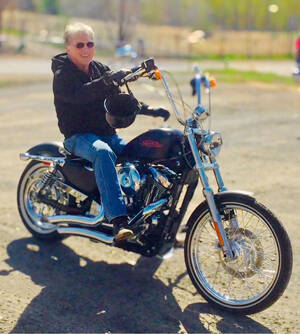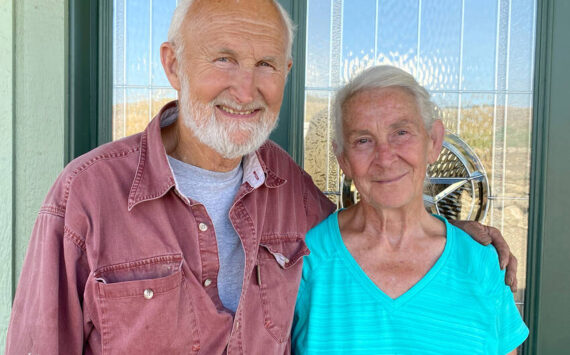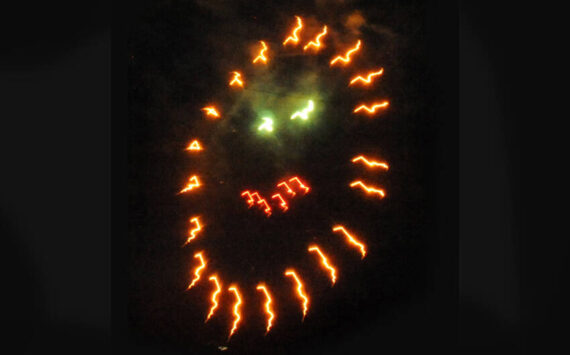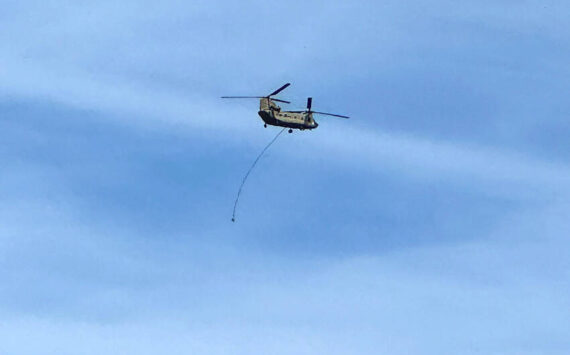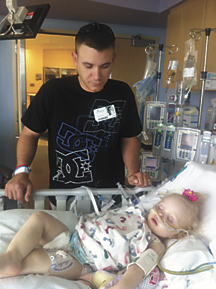
Two days after donating one of his kidneys to his daughter, Hayden, Adam Brazil stands by her side.
- KILLEEN, TEXAS – It would take three days for the U.S. Army to get him home to Texas from Fort Polk, a U.S. Army training post in Louisiana.
- A war was on, and Sgt. Adam Brazil could only sit, wait, wonder, pray, worry.
- It wasn’t a war he’d expected. But it was on, and not in Iraq, where he’d been twice as a Bradley fighting vehicle mechanic in his first five years of marriage. This time, it had struck in his home.
- The 2002 Tonasket High School graduate wanted to be with his family, to save his daughter’s life, which was very much in doubt. To be with his wife, Jamie, on the most terrifying day they’d ever known.
- “Those were the longest three days of my life,” he says now. “I have never been so worried about anyone or anything in my life. I also felt bad that Jamie was there going through this ordeal by herself.
- “I felt completely helpless.”
- Adam made it home and Hayden was stabilized, but the Brazil family’s journey had just begun.
- Last month, on March 19, Adam donated his kidney to his daughter.
- “Hayden has been a new child,” Jamie says. “We never realized how uncomfortable she really was until we saw her starting to get healthy. It’s hard to explain the feeling — sadness, because of what her life had been to that point. But now she’s climbing and running, where she’d barely been able to walk before.
- “It’s truly a miracle. We’ve been so blessed.”
- Hayden Grace Brazil was born May 8th 2010. At 29-days-old she was rushed to the Emergency Room and sent by ambulance to Scott and White hospital in Temple Texas where they ran many tests and at one month of age she was diagnosed with Congenital Nephrotic Syndrome.
- – Jamie Brazil’s “Hope for Hayden” Facebook page, Oct. 10, 2010
- There had been signs something wasn’t right, but for the first month, Adam and Jamie Brazil were told that all was normal with their infant daughter, Hayden.
- “It had been a high-risk pregnancy,” Jamie says. “Her alpha fetal proteins were through the roof. We did lots of ultrasounds, but the doctors could never figure out what the problem was.
- “After she was born we started getting concerned. She seemed puffy, she had trouble opening her eyes. Just lots of little things.”
- Three trips to the doctor didn’t reveal any problems, but did nothing to allay Adam and Jamie’s concerns.
- About a month later, Adam left for training at Fort Polk. That same day, Hayden’s legs turned blue and she was rushed to the emergency room. The Army wasn’t ready to let Adam come home yet. But after evaluating Hayden, doctors told Jamie to get her husband home as soon as possible.
- Jamie sent a message to Adam through the Red Cross’s military emergency communications service. Though he was stationed just a few hours away, it took three days to get him there.
- “It was a horrible three days,” she says.
- The diagnosis: congenital nephrotic syndrome. There is no cure. Hayden would need a kidney transplant, but she was far too young to risk that right away.
- Congenital nephrotic syndrome is a particularly nasty disorder. Caused by an abnormal form of the protein nephrin, which the kidney’s filters need to function normally, it is present from birth. The baby develops protein in the urine that causes the entire body to swell.
- According to the U.S. National Library of Medicine, many children with the syndrome do not survive their first year, and without a transplant the odds of making it to age five are slim.
- The Brazils’ task was to keep their daughter alive long enough to mature to the point where she could tolerate a kidney transplant.
- And there was the process of finding a suitable donor. Adam and Hayden shared the same blood type, and he immediately volunteered.
- “The first thing they looked for was the common blood type,” Jamie says. “Adam would have done it that day, if he could have.”
- Fortunately, the Army decided not to deploy him overseas while the family was dealing with Hayden’s condition.
- “At first, we didn’t even know if she was going to make it,” Jamie says. “We had to jump through a few hoops with the Army … We’ve been thankful that the Army did let him stay. Of course if they hadn’t, I probably would have thrown a tantrum and gone banging on some doors. I wasn’t going to let him go without a fight.”
- We are just waiting on Texas Childrens hospital in Houston to get organized and call us back with an appointment to start the work up process. Maybe by the end of the month. Hayden is 3 lbs. away from the weight they want her to be to remove her kidneys. We are excited and terrified. Please continue to keep her in your thoughts and prayers.
- – “Hope for Hayden,” Jan. 13, 2011
- Kendall Brazil was born in 2006, during Adam’s first deployment to Iraq. Adam saved his leave time so that he could be home in time for her birth.
- Once his deployment ended, they were able to buy their first home. With two jobs and another baby on the way, all seemed right with the world.
- “All of a sudden,” Jamie says, “we had to reevaluate everything. It’s not something anyone ever plans for. It was hard to even breathe.”
- But for Kendall, her family’s ordeal has been her family’s existence for as long as she can remember.
- “She doesn’t understand that all of this isn’t normal,” Jamie says. “Being at the hospital for Hayden is normal for her.”
- Hayden’s “normal” has been nothing like what most two-year-olds experience. It’s not just the endless visits to doctors and hospitals and the battery of 10-15 medications she’s been on since birth.
- “There are so many things we took for granted with Kendall that Hayden had never done,” Jamie says. “She’s never been to day care, could never really take a bath, couldn’t play in the pool. Even the little things like running to the store — either we can’t do them at all, or they take a ton of planning.”
- Meanwhile, family and friends in Washington and Texas rallied.
- “I feel very blessed, because I’m not sure every family could get through this,” Jamie says, adding that her and Adam’s disparate personalities helped balance things in their own home.
- “Adam is the strong, silent one,” she says. “I freak out about every little thing.”
- “They balance each other so well,” says Kristi (Brazil) Denison, Adam’s sister who currently works at Tonasket Elementary School. “Jamie is passionately verbal about the care that Hayden receives, and many times Adam has had to step in and calm her down. It’s actually quite comical to hear the stories afterward.
- “I truly believe that Adam and Jamie were put on this earth to have this situation, although I would never wish this upon my worst enemy.”
- Of Adam’s brother and three sisters in the blended Brazil family, Kristi is the only one who has had the chance to meet Hayden.
- “I’ve talked with my brother and sisters, and we are all so very proud to say (Adam) is ours,” she says. “They’re all excited that they’ll get to meet her now that she is going to be healthy enough to travel.”
- “This has been all of both our families, friends, and people we don’t even know,” Jamie says. There are prayer chains going for this little girl all over the world.”
- Nothing had prepared Adam for something like this, not even living and working in a combat zone for two years.
- “They are two completely different situations,” he says.
- January 9th is set for Hayden’s nephrectomy (kidney removal) we will be admitted on the 6th of January to prepare. Which means getting as much extra fluid off of her as possible… We will probably be in the hospital until the first part of February if all goes as planned… I’m not looking forward to this but I’ve known it was coming for 18 months now… You’d think it’d make it easier but it hasn’t. The uncertainty is overwhelming …. On the bright side we are another step closer to transplant .
- – “Hope for Hayden,” Dec. 15, 2011
- After a month in the hospital, Hayden was able to go home. But she didn’t get to stay there much. Hayden was subjected to infusions five days a week, four to eight hours a day. For the first several months, she stayed in the hospital every weekend, but as she grew she was granted weekend respites at home.
- It usually meant one parent was with Hayden at the hospital and the other was at home with Kendall, trying to take care of all the other parts of life that don’t stop just because you’re in a constant crisis mode. Jamie’s mother, Donna Frichtle, also traveled from Lind, WA, to spend several months helping keep Kendall, now in kindergarten, in a regular routine.
- In April of 2011, Hayden began peritoneal dialysis for six hours every night. (It differs from what most people think of with dialysis; in short, fluids are introduced into the body through a tube in the abdomen, and then flushed out). In December, Hayden and Adam were evaluated for the transplant. They had matching blood types, but there was much more to be determined before doctors could give the go-ahead.
- “Not only did we have to wait until she was old enough, the process of evaluating her for the transplant was huge,” Jamie says. “It was two to three days a week at the hospital in Dallas (a three-hour trip each way) for almost two months.
- “The things they had to do to make sure she was as healthy as she could be, were awful.”
- Hayden’s non-functional kidneys were removed Jan. 9, with the transplant scheduled for two months later. The wait was necessary insure her body would be ready to accept the new kidney.
- The Army still hadn’t given the go-ahead to allow Adam donate a kidney, but as far as the Brazils were concerned, that didn’t matter.
- “The military had to approve it, but in Adam’s mind it didn’t matter what they said,” Jamie says. “I mean, it did, because their insurance was paying for it. But he wasn’t going to not do it. I think — I hope — anyone would be that way if it was their kid.”
- The nephrectomy (kidney removal) itself went well, but it took Hayden a couple of weeks to shake off some side effects. She also was starting full-blown dialysis. The biggest challenge would be to keep her healthy enough for two months to be ready to accept the transplant.
- “Getting ready for that process was tough,” Jamie says. “Adam was still trying to work, but for a lot of this they needed both parents there. We both had to learn to do the dialysis because there always needed to be a backup.”
- Mom and I both are crashing at the hospital tonight with Hayden, Kendall is with her Auntie, Adam and Dad are at the RMDH resting. Adam goes in at 5:30 am and the surgery should start around 7-8 am… Had a good visit with the surgeon … Feeling good but I still won’t be able to sleep.
- – Hope for Hayden, March 18, 2012
- Adam’s kidney should be out in the next few minutes and on its way over here… This is all so dream like… It doesn’t feel real! …. Just spoke with Adam he’s pretty sore and groggy but in his room… Hayden’s new kidney is already working .. Now they are connecting the ureter to the bladder .. She
- will be in surgery for a few more hours. All of the prayers are working please keep them coming.
- -Hope for Hayden, March 19, 2012
- Hayden was kept asleep for the first three days after the transplant.
- It was another three days from hell.
- Adam was able to visit briefly but for the most part had his own recovery to deal with. Fortunately, Adam’s father had come to be by his side, while Jamie’s mother was with her.
- “To see your baby all filled with tubes like that, it just takes your breath away,” Jamie says. “And that wasn’t even the worst part. Waking her up was. That was the hardest thing in my life, watching her pain and confusion.
- “I was amazed at how quickly she bounced back. But for a couple of days I couldn’t believe that life would ever get better again.”
- Once awake, though, Hayden recovered quickly. After a month, she was home, though still facing a routine of lab tests that, while they will never stop completely, will become less frequent with time.
- “We were told she would recover faster than Adam,” Jamie says. “She was up and running crazy before he could even walk. She loves to run around and make messes. And if you try to clean them up, she’ll get upset. She’ll say, ‘No, it’s MY mess!'”
- Adam, too, should recover fully, and be able to resume active duty in time.
- “He’ll start back with light duty,” Jamie says, “but the surgeon said it shouldn’t hinder his career.”
- Hayden’s journey is far from over. Not only will recovery from this transplant take time, but she is likely to need at least two more transplants in her lifetime, depending largely on what types of advances are made in medicine over the next decade.
- “Statistics show live donor kidneys at best last 15 years,” Jamie says. “We hope that with all the medical advancements that hers will last longer.”
- There have been fundraisers in Texas and in Lind. Kristi hopes to organize one in Tonasket this summer. While most of the medical costs should be covered, Jamie said they’re not sure about all of it. And the medical expenses are only part of the financial consequences of their ordeal.
- “We wont know for awhile what we’ll have to pay out of pocket,” Jamie says. “So far the copay for the medications has been about $200 a month, and without insurance that alone could have been as much as $10,000.”
- Jamie hasn’t been able to work her job regularly for some time, though her employer has held her position for her.
- “I have a great boss who lets me do what I can when I can,” Jamie says. “But we’ve basically cut from two jobs to one, but still have the mortgage, car, food and medications. And there have been more three-hour drives, hotel stays, and travel expenses than we can count.
- “The fundraisers have really helped us to survive.”
- Meanwhile, the Brazils are learning to adapt to a new “normal.”
- “”We’re still trying to figure out what ‘normal’ is going to be,” Jamie says. “But they’re both doing really well. We really couldn’t have gotten a better outcome.
- “Hayden’s still having to wear a mask in public, which is interesting with a 2-year-old. We’ve tried to make it like dress-up, to try to make it ‘cool.'”
- Meanwhile, Adam’s siblings have expressed a lot more admiration for him than he probably could have imagined growing up with them.
- “When I think about Adam as a middle and high schooler, I’m just speechless,” Kristi Denison says. “Who would have thought he would be where he is now and done the amazing things he has done? Just to have turned out to be the awesome dad that he is.
- “I will go down this July to see them as I have for the last two years, but this time will be so different. Hayden already looks completely different than she did, and I haven’t seen her walk or talk yet. I am so excited to see this new little person.”
- Adam says that, beyond the obvious, the biggest benefit has been to his relationship with his wife.
- “I feel closer to Jamie because of everything we have been through together these past two years,” he says. “Other than tha
t, I don’t think much of anything has changed.” - And while Jamie doesn’t look forward to the day when Adam is deployed again, she does so with a new perspective.
- “Never a million years did I think it would have been possible,” she says. “But his being deployed didn’t hold a candle through what we’ve been through. Deployment was scary and horrible, but watching your daughter fight for her life trumps everything.”

